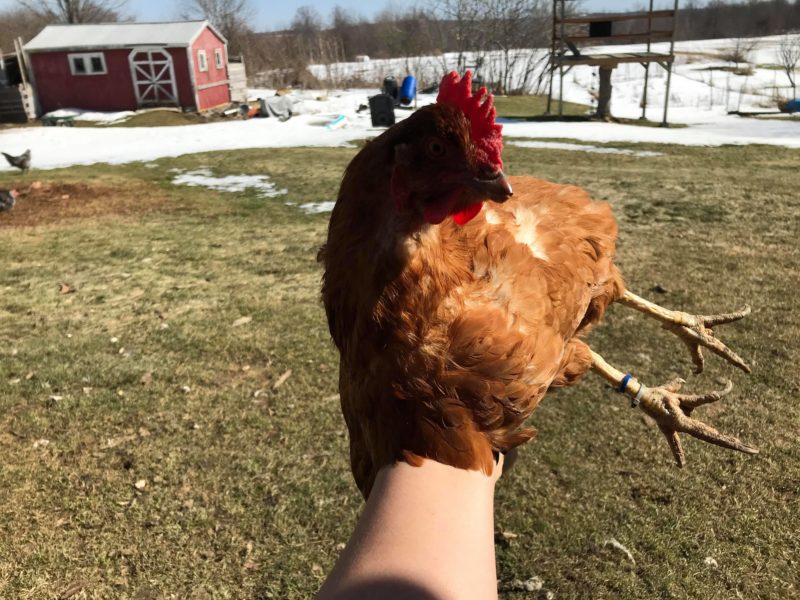Blogger Traci DeLore covers how to make some of the difficult decisions we need to make as chicken owners.
Visions of backyard chickens don’t usually make us think of difficult chicken decisions. We think of cute, fluffy chicks and of happy hens scratching the grass. We really think of delicious fresh eggs for breakfast.
However, the reality is that if you keep chickens, it likely won’t be too long before you need to make a difficult decision or two. Maybe that chick that was supposed to be a pullet just started to crow – and your town doesn’t allow roosters. Maybe a hen is sick and you have to decide what to do.
Here are some of the most frequent difficult chicken decisions I’ve had to make since I started keeping chickens.
Roosters
My town doesn’t care if I have a hundred roosters, but I’ve learned the hard way that things go wrong when I have multiple roosters around.
Just recently, two of my three full-sized roosters ganged up on our bantam Cochin rooster, Oreo. Now Oreo is not only my daughter’s pet, but he’s also a good rooster. He’s five years old now, a great flock leader, and is never aggressive. For all of those reasons, he is the rooster that gets to stay.

Poor Oreo took quite a beating from the two big guys, who picked at his comb, wattles, and head. I’m happy to report Oreo has fully recovered.
That meant I had to make a difficult chicken decision regarding the full-sized boys. All three were less than a year old and just coming into their first spring of wanting to mate. I’ve found that roosters of that age during this time of year can be aggressive toward each other. In this case, they turned on the smallest guy around.
Ultimately, I decided to euthanize all three of the full-sized roosters, bringing my block back down to just one head rooster, Oreo. While not an easy decision, it was the best decision for the overall harmony of the flock as well as for Oreo’s wellbeing.
Illness or injury
Chickens get sick. Unfortunately, chickens are also really good at hiding when they are sick. Often, you won’t even know your chicken is sick until it’s too late to save it

Poor Gem was sick for the better part of a month and nothing helped. You can see her comb and wattles had withered away to nothing. The humane thing, at that point, was to euthanize her.
What do you do when you have a chicken so ill it can’t eat or drink, it can’t walk, maybe it’s struggling for every breath it takes? It’s time to make a difficult chicken decision.
In my opinion, the most humane thing to do is euthanize it and end its suffering. Again, it’s not an easy decision. I never make this decision lightly, but I know I need to not only be able to make the decision, but also to act on it for the best management of my flock.
Age or no more eggs

Egg laying slows down after a chicken’s second year. They still lay – just not as often.
If you’re in the business of keeping chickens to sell the eggs, what do you do when your hens age and stop laying? Let’s be honest, it’s not very profitable feeding a bunch of chickens that aren’t laying any eggs for you to sell.
If you’re happy just having a flock regardless of how many eggs they lay, then this really isn’t an issue for you. However, if you’re doing this for a business? Be prepared to make some difficult chicken decisions somewhere around year three. In the past, we have culled older hens. We did it two times and I cried both times.
Those are the most common scenarios where I’ve had to make difficult decisions. If you get started keeping chickens, you should prepare. Develop your own criteria for making these decisions and have a euthanasia plan in place. You also need a plan for how you will deal with a chicken after its death.
In memory of Penny
Finally, I have to dedicate this post to my most special hen, Penny. You may have read about her here. I’m sad to say that Penny died on March 11.

I can’t even begin to describe how much I’m missing Penny. She’s in the photo above, laying on my hand. I took that photo just 2 days before she died.
She is the one chicken that I would have truly struggled to make that difficult decision with if she ever became ill. I think she knew that, too. After seeing her in that coop that morning (where she managed to fling chicken poop on me with her wing!) and running around the yard all day doing her Penny thing, she died after going in to roost that night. I found her when I went to lock up the coop for the night. She went on her own terms, and spared me from ever having to make the most difficult chicken decision when it came to her.
Traci DeLore grew up around chickens on her family’s farm, but didn’t start keeping her own chickens until she was in her 40s. Her desire to keep chickens came from a desire to have her own fresh eggs from chickens she knew were well cared for and happy. Traci started with six chickens – and then chicken math took over. These days, she has about 60 chickens — and three “rotten” ducks. (I say this because having ducks is like living with toddlers.) Traci also raises and processes her own meat chickens on occasion. Follow her on Instagram.













1 Comment
How do you euthanize your chickens?